The county, in turn, is looking to the public for help with this all-important task, just as the City of Tucson has been doing since it declared a climate emergency in 2020.
Start the survey! Pima County Climate Pollution Reduction Plan and Survey
In these changing times it has become so important to remain politically active, stay informed, hold our politicians and corporations accountable, and keep on top of our representatives to make sure they are representing our best interests. Please, support the actions and issues that matter to YOU. I will do my best to keep up with what is happening in our government and post the latest petitions and calls to action. Please, check in daily.
Environmental Day at the Capitol Thursday, January 25th 8:30 AM - 2:00 PM RSVP for Environmental Day at the Capitol here. Start the Year Off Right with Water Overview on Arizona Water This workshop is intended
to give you some of the basics about water in Arizona and help you prepare for meetings with
policy makers. We will have a panel of water experts to share information and there will be
time for questions.
|
Glimpse into the future of the Milagro on Oracle site! Once complete, Milagro on Oracle will house Tucsonans 55+ and individuals experiencing homelessness.
The project is part of the City’s 10-point Housing Affordable Strategy for Tucson (HAST), which calls for creation of more affordable housing. Additionally, this project is the City of Tucson's first Low Income Housing Tax Credit (LIHTC) project in 10 years and first LIHTC project developed under El Pueblo Housing Development, a newly formed non-profit.
Affordable Housing Strategy for Tucson
https://housingaffordability.tucsonaz.gov/?utm_medium=email&utm_source=govdelivery
The local news has been highlighting the work of Housing First and recent Thrive in the 05 projects, such as a new mural going up at Bailey's Fabrics, Tucson House history before rehabilitation, and the purchase of Stone and Speedway for future affordable housing!
Roughly a third of what ends up in the landfill is food waste. Think of every restaurant – and every home – and the food that doesn’t get eaten. When I was in Africa some of the lodges out in the outback fed the waste to hyena’s. We toss it into the landfill.
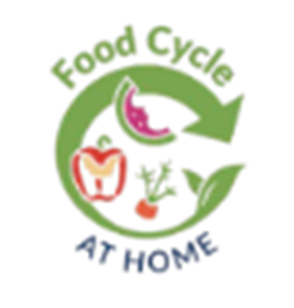 Starting right after the first of the year our Environmental Services folks will be starting a food scrap drop-off pilot project. Similar to how we tested the plastics program before jumping in with both feet, the food waste pilot will test to see if the public will support the program sufficiently enough to make it a permanent thing. Based on the comments I get from hanging around our plastic and glass roll offs I’m betting on you supporting the program. We will be putting out food scrap collection bins at 6 locations scattered around the city. Here’s a map showing where they’ll be located (No, ward 6 is not adding food to our already large array of bins.) |
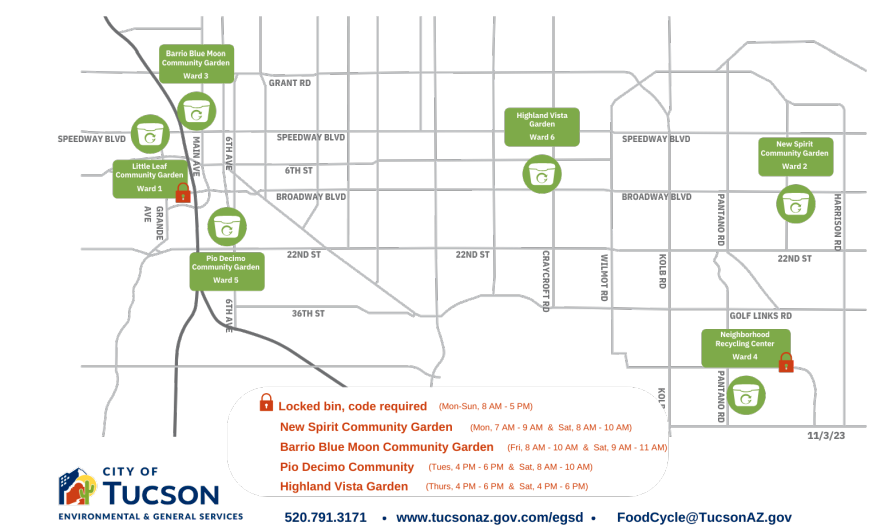 |
The ward 6 bin will be located in the Highland Vista community garden. In fact, 4 of the locations will be at one of the existing community gardens we have through a partnership in this program with The Community Gardens of Tucson (CGT.) Environmental Services will host the other two sites.
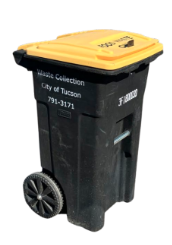
We’ve been partnering with local restaurants and grocers through our FoodCycle program and since April 2021 we’ve gathered over 1,400 tons of food and green waste, all diverted from the landfill and used to make composting material. We’re partnered with the UA CompostCats. You’ve met some of them here at ward 6 office during some of our plastics/recycle events. |
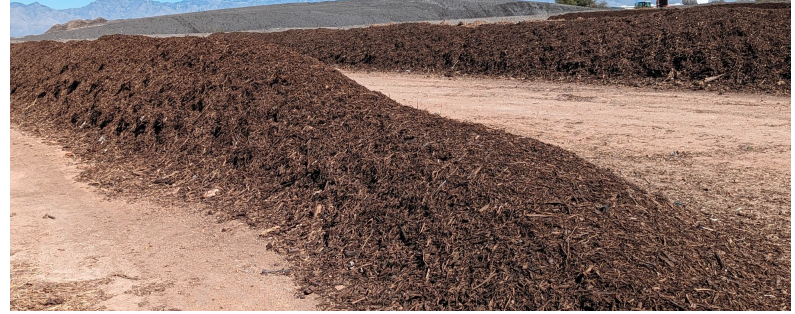 |
In order to control contamination, the 4 CGT sites will have scheduled hours, will have someone on site to monitor what’s being tossed into the bin and will be locked after hours. The two ES sites will be available 24/7 but will be padlocked. The pass code for the lock will be made available to people who have gone through the city-run training that will begin in December. All the controls are to assure the organics that are being collected are not contaminated.
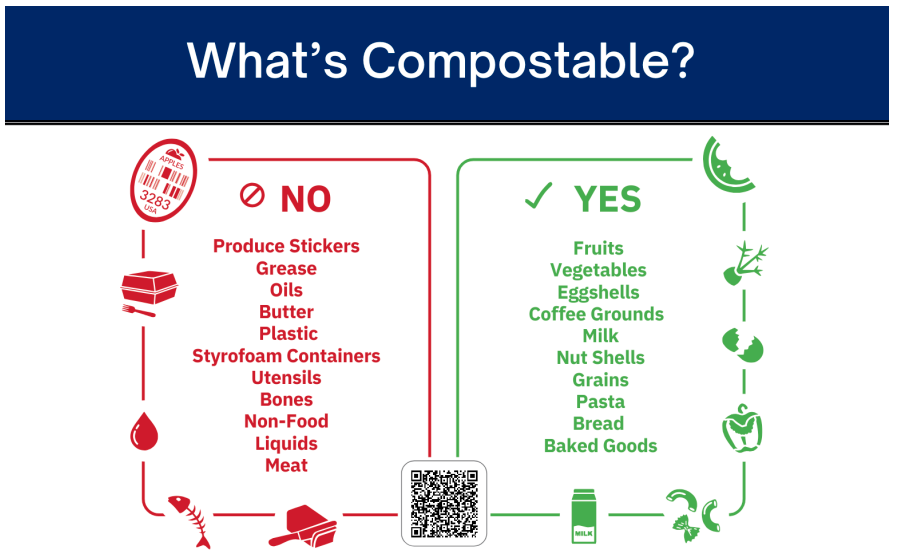 |
In addition to the 6 sites, through a grant ES received from the Arizona Recycling Coalition they’ve purchased 150 compost tumblers. The pilot program will also include distributing 25 tumblers to residents in each ward of the city that they can use in their own yards. Each resident using a tumbler will control the contaminants, and they can use the compost material they produce. Here’s an example of one of the tumblers.
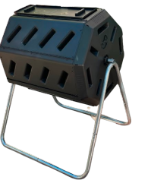 In order to be eligible for a tumbler homeowners will be required to downsize their trash container since all of your food and yard waste should now go into the tumbler. There will be training offered for the recipients of the tumblers – that will be scheduled to begin in January and the tumblers will be distributed in February. Thanks are due to Carlos DeLaTorre and his team at Environmental Services for putting the logistics of this program together. My hunch is that it will be well-received by Tucson residents and that it will serve as a model for other jurisdictions to follow – just as the plastics and glass programs have become. |
In line with the urgency of climate change effects, key regional entities are adopting ambitious, actionable climate plans. In May of 2022, Pima Community College approved their Climate Action & Sustainability Plan, and the City of Tucson approved Tucson Resilient Together on March 7, 2023.
The Pima County Department of Environmental Quality (PDEQ) is seeking input from Pima County residents on priorities that can strengthen our clean energy economy, enhance workforce training opportunities, and effectively reduce greenhouse gases while also addressing environmental injustices in disadvantaged communities. Please take this survey to help develop the Pima County Climate Pollution Reduction Plan.
More info from PDEQ
You may have seen in the news (10/16/23: https://www.kold.com/2023/10/
The goal is to develop a durable and ambitious plan with community leaders that is reflective of our communities’ needs, will strengthen our clean energy economy, enhance workforce training opportunities, and effectively reduce greenhouse gases while addressing environmental injustices in disadvantaged communities.
Please, take the Climate Pollution Reduction Plan Survey and spread the word to others. They would like to learn from the people within Pima County borders including the most vulnerable and underserved communities.
As Planning and Development Service continues to actively seek input from Tucson in shaping the City's general plan, the Plan Tucson team will be hosting two community forums in the coming weeks. Both events allow the public with the opportunity to offer their opinions and help guide the development of future goals and policies.
To best accommodate the needs of the community, there will be both virtual and in-person gatherings:
Virtual Community Forum
In-person Community Forum
These forums are more than a platform for feedback; they are a way to celebrate community spirit. Those participating in the virtual forum may win one of several prizes. Attendees of the in-person Community Forum will have the opportunity to enjoy local food, participate in raffles, and engage in activities like Ready Set Rec and nature walks.
The virtual and in-person meetings come near the midway point of Plan Tucson's Phase Two, which is expected to wrap up next spring. Another round of community forums is being planned for early 2024.
Visit the Plan Tucson Update page to view the Phase One Community Engagement Summary and to learn more about the Plan Tucson Update.
A medida que el Servicio de Planificación y Desarrollo continúa buscando activamente la retroalimentación de Tucson para dar forma al plan general de la ciudad, el equipo de Plan Tucson organizará dos foros comunitarios en las próximas semanas. Ambos eventos brindarán a la comunidad la oportunidad de expresar sus opiniones y contribuir a la formulación de los objetivos y políticas futuras.
Para adaptarse mejor a las necesidades de la comunidad, habrá reuniones tanto virtuales como presenciales:
Foro de la comunidad virtual:
Fiesta de retroalimentación en persona:
Estos foros son más que una plataforma para recibir comentarios; son una forma de celebrar el espíritu comunitario. Quienes participen en el foro virtual podrán ganar uno de varios premios. Los asistentes al Foro Comunitario presencial tendrán la oportunidad de disfrutar de comida local, participar en rifas y participar en actividades como Ready Set Rec y caminatas por la naturaleza.
Las reuniones virtuales y en persona se acercan a la mitad de la Fase Dos del Plan Tucson, que se espera concluya la próxima primavera. Se está planificando otra ronda de foros comunitarios para principios de 2024.
Visite la página de Actualización del Plan Tucson para ver el Resumen de participación comunitaria de la Fase Uno y obtener más información sobre la Actualización del Plan Tucson.
But while they took neighborhood feedback on what should be done with 5th/6th Street from Campbell to Alvernon Way, the main point of their survey was to get community feedback on lighting the stretch. We learned that street lighting can prevent 40% - 60% of vehicle accidents with pedestrians.
If you are a frequent traveler on 5th/6th Street, have a child that attends Howell Elementary or live in the neighborhood, you might want to weigh in on this project.
Here is a link to fill out the survey:
https://survey123.arcgis.com/share/1cf8fffe03f14c739cfea0165b5e9026
https://tucsondelivers.tucsonaz.gov/pages/5th6th
On August 24, 2023, the Arizona Corporation Commission (ACC) voted to cut the Resource Comparison Proxy (RCP) for Arizona Public Service (APS), Tucson Electric Power (TEP), and UNS Electric, by 10 percent. The RCP is the mechanism that is used to determine how much the utility will credit you for the solar you produce on your rooftop and send to the grid.
At its October 11th meeting, we are expecting the ACC to vote on whether or not to reopen the Value of Solar decision and ultimately that it will take action to harm efforts to increase accessibility for rooftop solar. They are likely to make other significant changes like eliminating the 10 year lock in for how solar is valued, removing grandfathering for net metering customers – so breaking a contract with those who adopted solar early on, or increasing the permissible annual step down for the RCP, etc.
All written comments have to be filed to the docket in Docket No. E-00000J-14-0023. We need comments to recommend NOT reopening the docket and for the ACC to keep its word and not break the contracts with those who have and who would like to adopt solar. It’s just not fair! If you can help:
If you need help or have any questions, email Sandy Bahr at sandy.bahr@sierraclub.org.
 |
| Photo credit KOLD |
Hotrods are racing down Speedway at all hours. And I can’t sleep thinking about all the auto related deaths in Tucson. Yesterday I saw photos of a totally demolished car caused by a drunk driver going over 100 MPH on Grant. Luckily the victims survived.
 |
| Photo credit KOLD |
As I write this, I know that someone will blame the Mayor and City Council. They’ll complain that we don’t have enough traffic officers. But the council included a substantial increase for law enforcement in the last budget. Police Chief Chad Kasmar is working to staff the shortage. One solution for our traffic problem is to have traffic cameras send tickets to speeders or people who run red lights, but Tucsonans voted (by a 66% margin) to make those cameras illegal. In March, the police department implemented an app where citizens can report traffic violations.
Traffic Watch
https://survey123.arcgis.com/share/b831037dea9a425d83fa836628c7f87e
Then there's the issue of the condition of our streets. Those hotrods race through town causing wear and tear on our main streets. Of course, people blame the city for the potholes, but let’s put the blame where it belongs. The money for fixing those main streets comes from our STATE gas taxes. But the state legislature doesn’t give us our fair share of tax revenues to fix those streets. After voters approved money for neighborhood streets in 2022, it took a year to collect enough taxes before they could begin working on neighborhood streets. I found out at a recent transportation meeting that they can’t even work on streets during the hottest months of the year because of the impact of extreme heat on the asphalt.
You can track their progress here:
https://experience.arcgis.com/experience/3487b2b052f0436990185e026618a6b9
The city council is aware of the condition of our streets and they are working on it. They have done extensive outreach to the community for our priorities on transit. They are installing traffic calming features in some neighborhoods. They have done a great job finding alternative funding sources for "alternate transportation". The plain truth is we have too many cars on the street. And too many people not following traffic laws. If we put in more lanes, we will have even more cars. And the same legislators who won’t pay to fix Tucson’s streets, sponsored bills prohibiting Tucson from even planning safer bike lanes. What I’m saying is do some research before you make snap judgments and feel free to get involved in coming up with solutions. And slow down for heaven's sake!
Join Arizona's youth across our state for Fridays for Future’s Global Climate Strike Day to demand strong and local climate action.
Show up to support and listen to young climate activists who are demanding climate solutions and action from our leaders. There will be information tables, speakers, and lots of committed activists.On Wednesday, August 30th, Sierra Club along with Chispa Arizona issued an Environmental Report Card for the Arizona Legislature and Governor. Once again, the highly partisan session resulted in most Republicans earning a failing grade on the report card. The good news is 32 legislators earned an "A" on the report card and voted time after time against anti-democracy and anti-environmental bills.
The 2023 Legislative Session was the longest session on record, officially spanning 204 days and finally wrapping up on July 31st. The session included significant breaks as there were vacancies, negotiations, and reluctance by some in the majority to adjourn as they wanted to keep an eye on the Governor. Very little of note was accomplished, however, and Governor Hobbs’ veto stamp got a workout as legislators sent up a slew of bad ideas.
The attacks on democratic processes this session were again significant and frequent with more than 200 bills introduced seeking to limit early voting, make voting more difficult, and limit the initiative and referendum process, and other efforts to hinder democracy. A measure to require a proportionate number of signatures from each legislative district for initiatives and referenda, SCR1015, was referred and will be on the ballot in 2024. If passed, it would make it extremely difficult to qualify a measure for the ballot.
2023 brought new attacks on transportation as the majority in the Arizona Legislature sought to put a stop to light rail expansion and really any substantial funding for transit, bicycle and pedestrian safety or anything that did not involve concrete or asphalt. Senator Jake Hoffman led the way in introducing anti-transit, anti-bike measures with five bills – SB1312, SB1313, SB1314, SB1697, and SCR1018 specifically targeting multi-modal transportation. All of these bills died in either the Senate or House.
Some positive highlights of the session included important provisions in the budget, SB1720, including $6 million for the State Parks Heritage Fund, $7 million for the Upper Verde State Park, $3.5 million for planning passenger rail service between Phoenix and Tucson, $300,000 for trees for schools, and $9 million for Economic Transition Resources for capital projects, economic sustainability developments, renewable energy projects and broadband projects located within twenty miles of the Kayenta Coal Mine.
Nearly all of the Republican caucus earned an “F” on the Environmental Report Card this session as they pushed and supported bills to limit transit, consideration of Environmental, Social, and Governance (ESG) issues, and to hinder voting. There were 32 senators and representatives and Governor Hobbs who earned an “A.”
The Sierra Club report card is available on the website in English here and Spanish here.
You can also view the news briefing we conducted on YouTube here.